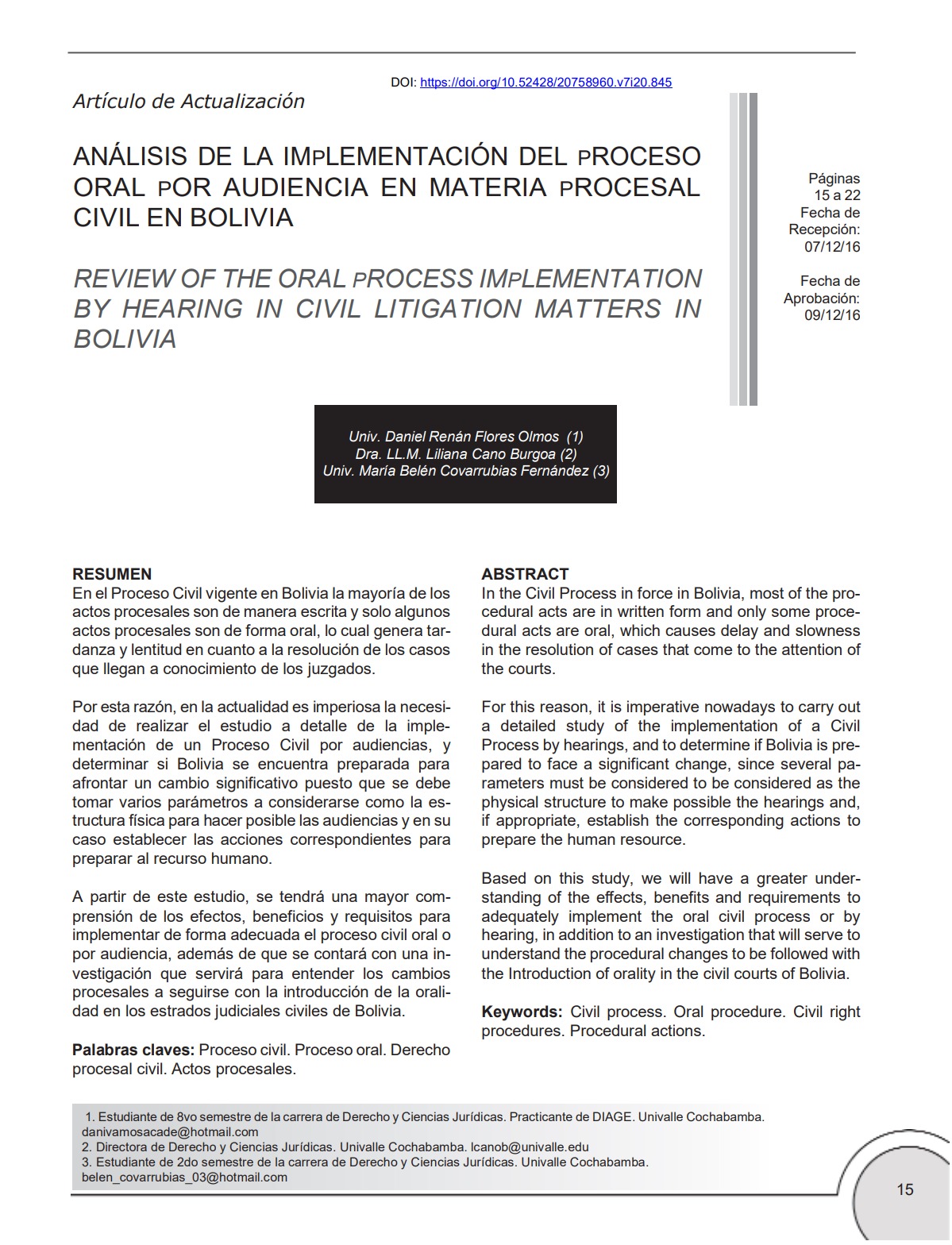Review of the Oral Process Implementation by Hearing in Civil Litigation Matters in Bolivia
DOI:
https://doi.org/10.52428/20758960.v7i20.845Keywords:
Civil process, Oral procedure, Civil right procedures, Procedural actionsAbstract
In the Civil Process in force in Bolivia, most of the procedural acts are in written form and only some procedural acts are oral, which causes delay and slowness in the resolution of cases that come to the attention of the courts. For this reason, it is imperative nowadays to carry out a detailed study of the implementation of a Civil Process by hearings, and to determine if Bolivia is prepared to face a significant change, since several parameters must be considered to be considered as the physical structure to make possible the hearings and, if appropriate, establish the corresponding actions to prepare the human resource.
Based on this study, we will have a greater understanding of the effects, benefits and requirements to adequately implement the oral civil process or by hearing, in addition to an investigation that will serve to understand the procedural changes to be followed with the Introduction of orality in the civil courts of Bolivia.
Downloads
References
CÓDIGO DE PROCEDIMIENTO CIVIL (Bolivia). Decreto Ley Nº 12760, de 6 de agosto de 1975. Gaceta oficial, La Paz. Bolivia.
PALACIO LINO ENRIQUE. Manual de derecho procesal civil (Buenos Aires). Abeledo Perrot.1995; p. 292.
CÓDIGO PROCESAL CIVIL VIGENTE (Bolivia). Legislación general (Constitucional, Civil, Procesal).
NUEVO CÓDIGO PROCESAL CIVIL (Bolivia), Ley Nº 439, de 19 de noviembre de 2013.
ALSINA HUGO. Tratado teórico práctico de derecho procesal civil y comercial. 1963. Edit. Ediar Soc. Anon. Buenos Aires.
LEY Nº 17.454. Código Procesal Civil y Comercial de La Nación Argentina. 1981.
CASTELLANOS TRIGO GONZALO. Código de procedimiento civil. 2004. Alexander, Cochabamba.

Downloads
Published
How to Cite
Issue
Section
License
Copyright (c) 2016 Daniel Renán Flores Olmos, Liliana Cano Burgoa y María Belén Covarrubias Fernández

This work is licensed under a Creative Commons Attribution 4.0 International License.
Authors who publish with this journal agree to the following terms:
- Authors retain copyright and grant the journal right of first publication with the work simultaneously licensed under a Creative Commons Attribution License 4.0 that allows others to share the work with an acknowledgement of the work's authorship and initial publication in this journal.
- Authors are able to enter into separate, additional contractual arrangements for the non-exclusive distribution of the journal's published version of the work (e.g., post it to an institutional repository or publish it in a book), with an acknowledgement of its initial publication in this journal.
- Authors are permitted and encouraged to post their work online (e.g., in institutional repositories or on their website) prior to and during the submission process, as it can lead to productive exchanges, as well as earlier and greater citation of published work.









